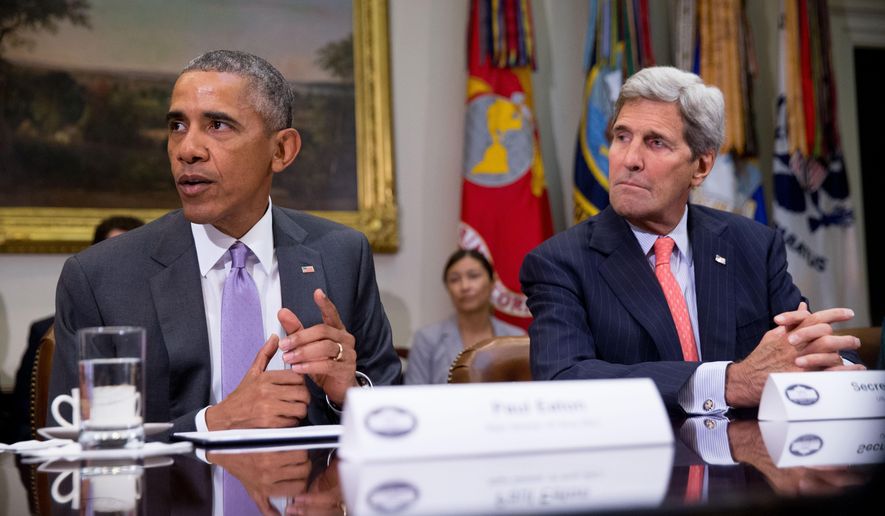House Republicans demanded this week that President Obama apply strict visa travel rules to anyone who visits Iran and then tries to come to the U.S., saying the Islamic republic was always meant to be one of the targets of a crackdown on potential foreign fighters sneaking into the country.
Mr. Obama signed the legislation last week, but his top diplomat, Secretary of State John F. Kerry, almost immediately told Iran that there may be wiggle room in how the U.S. enforces the law. In particular, Mr. Kerry insisted that he wouldn’t let the law interfere with U.S. obligations under the nuclear deal to which Mr. Obama and other foreign leaders agreed this year.
Republicans, in a letter led by House Majority Leader Kevin McCarthy and signed by key committee chairmen, said they were shocked by the overtures to Iran because they worked on the language of the law with the administration and none of Mr. Obama’s aides raised any concerns.
But now, they said, it appears he may try to flout the law just days after he signed it.
“Congress and the president strengthened the [visa waiver program] in order to protect the national security of the United States. Iran is impacted by this new law because it is a U.S.-designated state sponsor of terrorism,” the Republicans wrote in the letter released Wednesday. “The simplest way to eliminate this restriction is for Iran to end its support of terrorism.”
The letter could become key evidence if the matter reaches the courts, where Congress’ intent would be key evidence in deciding whether Mr. Obama was enforcing the law properly.
Homeland Security and State Department officials say they had not decided how they would carry out the visa changes.
“At this time, no determination has been made as to how waiver provision would be implemented. We will announce any changes affecting travelers to the United States from visa waiver program countries as soon as that information is available,” said S.Y Lee, a Homeland Security spokesman.
The Visa Waiver Program has been seen as a major loophole for would-be terrorists in the wake of attacks in Paris and California. The program waives visas — and the strict vetting, such as in-person interviews — for travelers from 38 countries deemed to be friendly to the U.S. and to have good screening in place.
Republicans had been warning of problems for more than a year, but the administration did not get on board until last month’s attack in Paris, perpetrated by French and Belgian citizens who became radicalized by the Islamic State terrorist group.
It became clear that they could have easily used those passports to travel to the U.S., without facing strict scrutiny, because France and Belgium are visa waiver countries.
Part of the year-end spending bill Congress passed and Mr. Obama signed last week included changes that require anyone who has recently visited Iraq, Syria or any countries deemed sponsors of terrorism to have to undergo full screening, even if they are from visa waiver program countries.
Iran is implicated because it is deemed a sponsor of terrorism, but the Islamic republic warned that the changes could be interpreted as punishment for those who do business with Iran, potentially running afoul of the nuclear deal that Mr. Obama signed.
In communications with Iran over the weekend, the State Department said it was aware of the concerns and would implement the law in a way that wouldn’t violate the nuclear deal.
Speaking to reporters this week, State Department representatives pointed to provisions that give the Homeland Security secretary waiver powers in cases where national security interests dictate.
“It would be … a little too early to say if and when that authority might be used,” spokesman John Kirby said.
Congressional Republicans warned Mr. Obama not to even think about using it, saying the waivers were meant for individual cases, not entire classes of travelers — and that business reasons didn’t rise to the level of national security interests that the waiver requires.
“Not only was such an exemption from the law not included in the legislation, it was specifically discussed during bill negotiations with administration staff and expressly refused by members of Congress,” the lawmakers said. “This letter serves to dispel any notion that the congressional intent would allow the waiver authority to be used for business travelers.”
The U.S. relationship with Iran has been a major sticking point between Congress and the Obama White House.
Republicans and Democrats have said they see signs Iran is already testing the outer boundaries of acceptable behavior under the nuclear deal, which requires Iran to rein in its nuclear program in exchange for the lifting of economic sanctions and return of tens of billions of dollars in Iranian money that has been frozen in bank accounts outside of Iran.
Mr. Obama, intent on making the nuclear deal work, has been reluctant to call out Iran over the actions that have angered Capitol Hill.
Republicans in Congress, meanwhile, see the promises of a waiver as yet another executive action Mr. Obama might take to refuse to carry out part of a law he doesn’t like — even though he signed it.
Mr. Obama did manage to block other provisions he didn’t want — including restrictions on his plans to resettle 10,000 Syrian refugees in the U.S. in fiscal year 2016. Mr. Obama said his administration can screen out potential bad actors, and he has threatened to veto any bill that would interfere with his plans.
• Stephen Dinan can be reached at sdinan@washingtontimes.com.




Please read our comment policy before commenting.